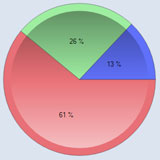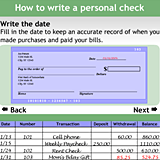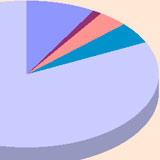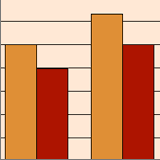Financial Literacy ResourcesFinancial Literacy Resources
Fostering Financial Literacy in ESL Classrooms Using New Media Tools
In these lessons students learn about managing money, banking, credit, debt, home financing and loans while practicing listening, reading, speaking and writing skills.
By integrating new media tools into the curriculum we hope educators will be able to engage ESL learners by making unfamiliar financial concepts as concrete as possible.
 Educators - How to Use This Site Target group - from high beginning to low intermediate adult English language learners, in particular low-income, recent-arrival immigrants and refugees, to high-intermediate and advanced ESL students in academic-credit classes - these lessons could be adapted for noncredit and lower-level students.
Educators - How to Use This Site Target group - from high beginning to low intermediate adult English language learners, in particular low-income, recent-arrival immigrants and refugees, to high-intermediate and advanced ESL students in academic-credit classes - these lessons could be adapted for noncredit and lower-level students.
Four steps
- Try out these lesson plans or some of the activities
- Use the pre and post assessments at the end of each lesson
to gauge impact - Bring your students to the site to try out the new media tools
- Help us to evaluate the effectiveness of this curriculum by
using the teacher and student surveys
Students
Tell us what you think -- fill out our surveys at the end of the lessons or activities.
Six Lesson Plans
 1. Financial Literacy Unit for English Language Learners
1. Financial Literacy Unit for English Language Learners
An overview unit
This unit focuses on language acquisition for English Language Learners specifically with regard to vocabulary and grammatical structure pertaining to financial literacy. Students learn about managing money, banking, credit, debt, home financing and loans while practicing listening, reading, speaking and writing skills.
Lesson Plan
Financial Literacy Unit (PDF)
New Media Tool to use in the lesson
Budget Builder Calculator
Take the Teacher Survey
Take the Student Survey
 2. Understanding Checks and Checking Accounts
2. Understanding Checks and Checking Accounts
High beginning to low intermediate adult English language learners
Students explore different payment options, focusing on using checks. They evaluate the advantages and disadvantages of having a checking account as well as the methods of cashing and depositing a paycheck. The lesson emphasizes the cost-saving effects of a checking account and its benefit to low-income, recent-arrival immigrants.
Lesson Plan
Understanding Checks and Checking Accounts (PDF)
Take the Teacher Survey
Take the Student Survey
 3. Paying with Plastic: An Introduction to Credit Cards
3. Paying with Plastic: An Introduction to Credit Cards
High-level beginning adult ESL students who are literate in their first languages
In this unit, students are introduced to the benefits and drawbacks of using credit cards in the United States drawing upon their prior experience with credit and debt. They explore notions of interest and annual percentage rates while assessing their own wants, values and needs regarding spending - and saving-money.
Lesson Plan
Paying with Plastic: An Introduction to Credit Cards (PDF)
New Media Tool to use in the lesson
Interactive Game: It Costs What?
Take the Teacher Survey
Take the Student Survey
 4. Budgeting Made Simple: Money Management 101
4. Budgeting Made Simple: Money Management 101
Low-intermediate to intermediate ESL learners who have recently immigrated to the United States
In this lesson, students will examine their personal spending habits, identifying and gathering data about their monthly expenses, and they will use online tools to create a home budget and long-term savings plan.
Lesson Plan
Budgeting Made Simple: Money Management 101 (PDF)
New Media Tools to use in the lesson
Marketplace's
Home Budget Analysis Calculator
Listen to the Youth Radio story of Blanca Cabrera, a 19-year-old who, like many young people, is living at home with her parents, trying to finish up school and working on the weekends.
Take the Teacher Survey
Take the Student Survey
 5. Becoming a Homeowner
5. Becoming a Homeowner
Intermediate- to high-level ESL students
Students analyze the pros and cons of renting versus buying a home, learn about the basic steps involved, and explore Internet resources that relate to becoming a homeowner.
Lesson Plan
Becoming a Homeowner (PDF)
New Media Tools to use in the lesson
<a href="http://marketplace.publicradio.org/toolbox/calculators/MortgageLoan.html Marketplace's Mortgage Loan Calculator
Take the Teacher Survey
Take the Student Survey
 6. What to Spend and How to Save
6. What to Spend and How to Save
High-intermediate to advanced ESL students
To raise students' awareness of their spending habits by helping them create a budget to plan and save for short-term and long-term goals and to familiarize students with online tools that can assist with this process.
Lesson Plan
What to Spend and How to Save (PDF)
New Media Tool to use in the lesson
Savings Goals Calculator
Take the Teacher Survey
Take the Student Survey
Quiz Developed by Sylvia Yau
Sylvia Yau is a candidate for the M.A. degree at San Francisco State University, with a TESOL focus. She previously worked as a corporate lawyer, specializing in financial services and corporate law and received her J.D. degree from from Boalt Hall School of Law (UC Berkeley).
Glossary of Financial Terms
Credit history, Credit report: A credit history is a record showing individual consumer debts and whether they were paid on time and as agreed. Credit institutions have created detailed documents, called credit reports, of your credit history, which they provide to lenders, landlords, and others.
Default: Failing to do something you agreed to do. If you have a credit card, the most common default is not making a payment on time. If you rent an apartment, you are in default if you don't keep the apartment in good condition.
Defective product: Any merchandise you buy that is broken when you buy it or does not function the way the seller said it would.
Fraud, fraudulent: A trick or deception intended to gain information or something of value.
Identify theft: Unauthorized use of someone's personal data, for example a driver's license or social security number, for any unlawful purpose, such as to obtain a credit card or loan.
Opt out: To tell financial companies that you do not agree to their sharing of your personal financial information with other companies that offer loans or other financial services.
Phishing: Using electronic communication to obtain personal information, such as usernames, passwords, and credit card details, by pretending to be someone you know or have a relationship with, such as your credit card company.
Scam: A way to cheat people and trap them into giving money.
Solicit, solicitation: Solicit means to ask someone for help, money, or information. Credit card solicitations are sent by credit card companies that purchase lists of consumers and use them for mass mailings to offer credit card services to potential customers.
Consumer Awareness Slideshow
Media-Rich Resources
NEW MEDIA TOOLS USED IN THE LESSON PLANS ABOVE
Home Budget Calculator
http://marketplace.publicradio.org/toolbox/calculators/HomeBudget.html
Savings Goals
http://marketplace.publicradio.org/toolbox/calculators/Savings.html
Check Writing Slideshow
http://www.thebeehive.org/money/spend-it/how-write-check
Budget Builder
http://thebeehive.org/money
Track Your Expenses
http://www.thebeehive.org/sites/default/files/Track_Your_Expenses_by_Hand.pdf
Marketplace Money Toolbox
http://marketplace.publicradio.org/toolbox/
Mortgage Loan Calculator
http://marketplace.publicradio.org/toolbox/calculators/MortgageLoan.html
Mortgage and Rent Calculator
http://www.thebeehive.org/housing
All About Equity
http://www.thebeehive.org/housing/prepare-buy/financing-your-home/interactive-all-about-equity
Lunch Savings Calculator
http://marketplace.publicradio.org/toolbox/calculators/LunchSaver.html
Credit Card Payoff
http://marketplace.publicradio.org/toolbox/calculators/PayoffCC.html
Just Charge It!
http://senseanddollars.thinkport.org/games/charge/home.html
Bank It or Bust
http://www.thirteen.org/finance/games/bankorbust.html
It Costs What?!
http://www.thirteen.org/finance/games/itcostswhat.html
USEFUL WEBSITES
http://www.kqed.org/financialliteracy
Curriculum website: Fostering Financial Literacy in the ESL Classroom Using NewMedia Tools. Includes a financial literacy quiz and consumer awareness resources.
http://www.thebeehive.org
Beehive.org: website produced by the nonprofit organization One Economy; provides information and resources about money, health, jobs, school and family.
http://marketplace.publicradio.org/toolbox/calculators/
American Public Media's Marketplace series website
http://www.thirteen.org/finance/index.html
What's Up in Finance? website produced by Thirteen WNET; offers articles, tools, games and interactive questionnaires.
http://www.elcivics.com/housing_lesson_1.html
Housing information provided by EL Civics for ESL Students geared toward English Language Learners.
http://eslhomebuying.edublogs.org/
Becoming a Homeowner in the U.S.; blog to help ESL students learn about buying a home in the United States.
http://www.hud.gov/webcasts/archives/buying.cfm
Webcasts on Buying a Home; section of the U.S. Department of Housing and Urban Development's website that contains links to various webcasts on such topics as buying and owning a home, avoiding predatory lenders, and so on.
http://www.hud.gov/apps/section8/step2.cfm?state=CA%2CCalifornia
HUD website that aids in the search for subsidized housing in California.
http://www.handsonbanking.org/en/
Take charge of your own finances and reach your goals with "Hands On Banking®"
AUDIO LINKS
"Youth Voices on the Economy"
http://www.youthradio.org/news/youth-voices-economy
"Family Takes Frugality to the Extreme"
http://marketplace.publicradio.org/display/web/2009/07/03/pm_frugality/
"Where It Pays to Make It from Scratch"
http://marketplace.publicradio.org/display/web/2009/08/07/mm-frugal-blogger/
RELATED PROGRAMMING FROM KQED-KTEH, PBS and NPR
Depending upon student proficiency in English, the following programs offer topical coverage of the economy. Educators can visit these websites and select video and audio clips on different topics for their student group.
Marketplace
http://marketplace.publicradio.org/
NOW (PBS)
http://www.pbs.org/now/topics/economy.php
"Out of the Woods" (NOW)
http://www.pbs.org/now/shows/506/index.html
"Help for Homeowners" (Planet Money)
http://www.npr.org/templates/story/story.php?storyId=94427042
"Facing the Mortgage Crisis"
http://www.kteh.org/mortgage
The NewsHour with Jim Lehrer
http://www.pbs.org/newshour/